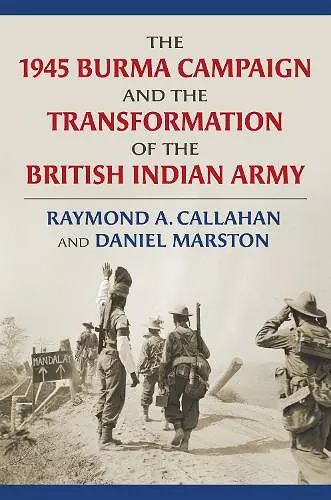The 1945 Burma Campaign and the Transformation of the British Indian Army
Daniel Marston author Raymond Callahan author
Format:Hardback
Publisher:University Press of Kansas
Published:28th Feb '21
Currently unavailable, our supplier has not provided us a restock date

In 1945, the Indian British XIV Army inflicted on the Imperial Japanese Army in Burma the worst defeat in its history. That campaign, the most brilliant and original operational maneuver conducted by any British general in the twentieth century, largely forgotten until now, is a full and fresh account utilizing a full range of materials, from personal accounts to archival holdings-including the bits the official historians left out, such as the attempt by a jealous British Guards officer to have Slim sacked at the conclusion of the campaign.
After the retreat from Burma in 1942, Lieutenant General Sir William Slim, commander of the British XIV Army, played a crucial role in the remarkable military renaissance that transformed the Indian Army and then, with that reborn army, won two defensive battles in 1944, and in the 1945 campaign shredded his Japanese opponents. Behind this dramatic story was another: the war marked the effective end of the Raj. This great transformation was, of course, brought about by many factors but not the least of them was the 'Indianization' of the Indian Army's officer corps under the pressure of war. As Slim's great victory signposted the change from the army Kipling knew to a modern army with a growing number of Indian officers, the praetorian guard of the Raj evaporated. 'Every Indian officer worth his salt is a nationalist,' the Indian Army's commander-in-chief, Claude Auchinleck, said as the XIV Army took Rangoon.
The Burma campaign may not have contributed in a major fashion to the final defeat of Japan, but it was of first-rate importance in the transformation of South Asia, as well as underlining the continuing importance of inspired leadership in complex human endeavors.
A much-needed study of the Burma campaign in 1945 by the two foremost historians in the field. Not only do they chart the transformation of the Indian Army but also they relay the story of the forgotten African soldiers fighting in Burma. The authors demonstrate that it was largely due to the contribution of these troops that the Imperial Japanese Army was defeated by 1945. The book is extremely engaging and eloquent: an essential text for anyone studying the campaign. Its accessible prose makes it such a pleasure to read-it therefore deserves a much wider readership than just historians." - Alan Jeffreys, author of Approach to Battle: Training the Indian Army during the Second World War
"There is a stage in every topic when it becomes possible to produce a study that will be 'the' book everyone interested in the matter should read. That time has come, and The 1945 Burma Campaign and the Transformation of the British Indian Army is 'the' book. Callahan and Marston explain how and why the liberation of Burma in 1945 was the peak of military excellence for Allied combined-arms campaigns during the Second World War." - Brian P. Farrell, professor of history, National University of Singapore, and author of The Defence and Fall of Singapore
ISBN: 9780700630417
Dimensions: 233mm x 162mm x 27mm
Weight: 580g
288 pages